Don't wanna be here? Send us removal request.
Link
#disclife#community#discgolfnearme#play#discgolfcoursedesign#discgolfcoursedesignandinstallation#localdiscgolf#recreationactivitydesign#discgolfisrad#discgolf#discgolfadventure#tourism#ruralcourses#increaserevenue
0 notes
Text
Put your best putt forward
When was the last time you felt truly confident in your putt? It takes practice to become one of the pros, but it shouldn’t become a hang-up for you out there on the course. Let’s look at some ways to improve your end-game.
What is Disc Golf putting and why is it important?
For those of you are new to the game, putting is the final 10-ish metres to the basket; essentially the final throw—or throws—of the game. These final meters are referred to as the putting circle. Putting requires a steady hand and disc.
Why is it important? Ask any kind of golfer, and they’ll tell you the same thing: this is how you “sink the hole,” as it were. The adage “drive for show, putt for dough” really becomes relevant here. Though you’ll likely get a mix of advice of what matters most, many disc golfers agree that putting is the most important because it can shave those extra points off par and save your game from previous drive blunders.

Disc Golf Putting Types
Searching the internet for putting styles will yield millions of results. Everyone seems to have their own style that works for them. But their styles may not work for you. Let’s explore some simple ways to start off your repertoire.
The Spin Putt: Though professionals disagree on what type of putting is the best, it’s safe to say that the spin putt is widely regarded as a putting favorite for beginners. Throw the disc with a spin creating a linear flight path toward the basket. This putt is stable and the easiest to master. It tends to be easier to keep a disc in flight with the spin putt because it is less affected by changes in the wind.
The Push Putt: Unlike the spin putt, the push putt starts from your lowered hand, essentially tossing the disc into the basket. The push putt still requires spin, so it’s far less stable than its counterpart. The nose of the disc turns up, allowing air to blow up underneath and make that disc hula. But, if you’re a fan of the granny shot, this one isn’t far off, which makes it a good starter.
Though there are many types of putting, and we’ll guarantee that the more you play the more you’ll learn, these are the most used for beginners, and are a staple for pros, too! If you’re unclear on what we mean by spin or push putts, go ask an expert, or check out the video from Eric McCabe here. Put both into practice and find your own style!
0 notes
Link
0 notes
Text
Importance of Outdoor Play in Childhood
Do you ever see your kids playing with their friends outside anymore? Consider the necessity of outdoor stimulus! Kicking around a plastic bag through the streets does give your kids exercise, but that’s not the best way to trigger mental advancement. There are better ways to get your kids in the sunshine than putting a projector outside and making your kids squint as Princess Peach throws grenades at Bowser. Being outside is essential to a growing body—in fact, to every body—and disc golf is a great way to get your kids out in the fresh air.
PHYSICAL PLAY
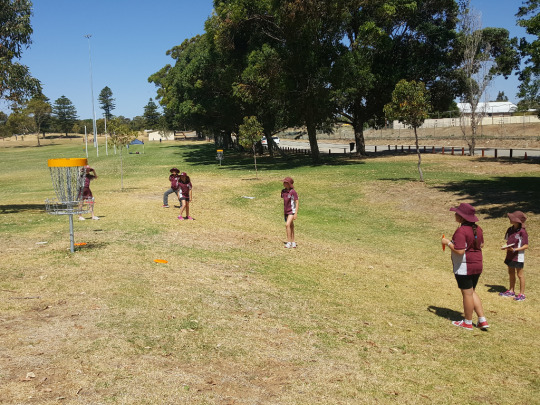
Playing outside is a great way for children to learn new things about physical activity. Disc golf uses muscles that are less common than those used in everyday activity. Disc golf focuses on stabilizing muscles in both the upper and lower sections of the body, which provides a great basis for growth. Spending time outdoors naturally develops hand-eye coordination due to physical interactions, but disc golf provides the unique ability to train children to fine-tune these skills through repetitive motion.
SELF-AWARENESS
How often do your kids get to experience working with their hands in a way that doesn’t involve moving their thumbs? Getting out into nature provides stimulus for mind and body, which is essential for growing children. Disc golf makes kids move in and participate with nature. Letting your child take risks out of the home builds their brains, and providing a creative outlet like disc golf builds their bodies.

IMAGINATIVE PLAY
Outside, the great frontier. Watching the wind whip flora and fauna as you rush in and out of nature’s obstacles provides a great background to some truly epic stories. Children who are stuck inside all day often experience stories given to them; to make it worse, images are given to them as well, making imagination only applicable to those who create media. Kids should experience some of this on their own.
While sports are not often referred with imagination in mind, making a sport your own takes a lot of time and patience, forcing your kids to think out different strategies. Disc golf requires thinking outside the box and developing new game plans to challenge different opponents.
THE NATURE LESSON
Not only is disc golf good for the experience of playing a competitive game, but it also provides the opportunities to grow through learning about nature. Sitting in the house all day can be a drag. If you don’t go crazy by nightfall, you’re one of the lucky few. Just image how the lack of stimulation affects your kids!
Spend time teaching your kids about the importance of outside living. The benefits you get from taking a trip to the disc golf course extends far beyond the physical. Take the time to teach your kids about nature. Explain what they’re seeing and how their presence impacts nature. Build strong and healthy kids through providing an outlet for the jitters and involving them in life’s great experiences.
Whatever the reason you have to get the children out of the house, consider disc golf. Not only are kids more likely to benefit from the mental and physical nature of the outdoors, but spending time with you will give your kids positive memories for a lifetime.
0 notes
Link
0 notes
Text
Increase Revenue In Your Community Through Disc Golf
Think for a moment about the last time you attended a major sporting event – was it a football game or a tennis match? Take yourself back to that time and place and evaluate how many people were there. Now imagine that each of those attendees needed to fill up their car with gas before heading home, many likely ate at least one meal while in town, and for some, they even spent the night before making the drive back the following day.
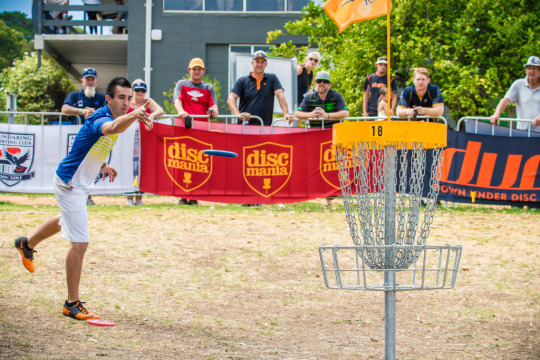
Large events like these are often held in big cities, but the impact is still the same – any game or match brings in massive amounts of money to the place in which it’s held. Not only do these events provide a fun activity for people from all walks of life, but they truly help to boost local businesses.
Now let’s take this idea and shrink it down to a much smaller scale and change some of the details a bit – picture a small to mid-sized town or city that hosts a disc golf tournament. Although these events aren’t quite as large as a major game, the impact is still relative. If you’re not sold on the idea just yet, here’s a closer look at how disc golf can increase revenue in your community.
Going The Distance
Disc golf is still an emerging sport and there aren’t a plethora of courses in each town just yet. Those who are committed to competing regularly find that they often drive hours away to partake in events, and given that they need to perform well each day, it’s a safe bet that they won’t be commuting back home multiple times. This means that local hotels and motels can enjoy an influx in bookings over a two to three day period without even having to try.
Similarly, both players and spectators typically don’t pack in days worth of food when a disc golf tournament takes place as it’s just not convenient to do so. Local cafes and restaurants will see a boost in business as well, as they’ll have a hungry bunch to feed after the competition ends each day!
Focusing On Sales
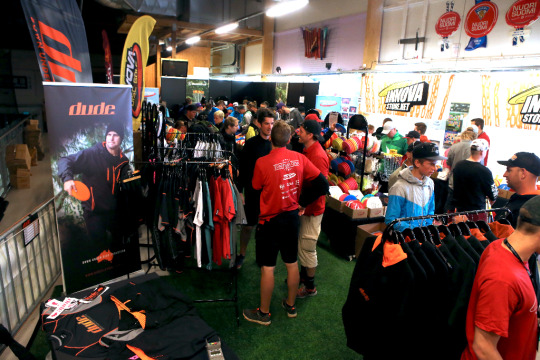
Towns that are more familiar with disc golf as a whole are typically quite excited to host a tournament or two each year as they find far more visitors are willing to spend money at sporting goods stores. Think back to our initial scenario about football games – how likely are you to stop into a shop and purchase a ball, jersey, or other types of memorabilia?
The same thought process rings true for disc golfers, and anyone who stocks discs, bags, stools, apparel, or other accessories will position themselves to make a ton of money over the course of the event. Sure, people can purchase disc golf gear online at any time, but there’s something special about buying a disc while you’re in town for the event.
Aside from the retail boost that disc golf brings to a community, those who manage the courses themselves can often reap a large amount of revenue during tournament time. Courses that have been installed at golf clubs usually require a greens fee in order to play, and some parks do include a pay to play feature as well. When tournaments often have 100 or more players in attendance, this small per person fee can add up quickly.
Giving Back
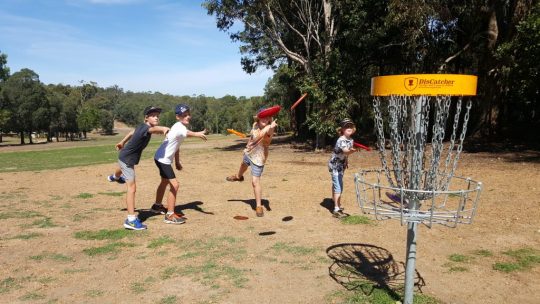
It takes an immense amount of time and energy to host a disc golf tournament, and more often than not, the people who take on this task are doing it for free. Disc golf clubs typically run under a nonprofit status and if they do make any money from an event, they either donate it to a local organization or use it to further improve upon the courses in the area.
By supporting these clubs, residents are truly investing in the livelihood of their community and helping to make it a more beautiful place. Coupling a disc golf tournament with a one-day clinic to raise additional funds can even help to benefit children’s programs, provide the resources to integrate disc golf into local schools, and so much more.
On the surface, a disc golf tournament may seem like a niche event that shuts down your favorite park for the weekend, but in reality, it’s a major gathering that can significantly impact the well-being of a community. With more and more frequent events comes more opportunity for communities to benefit from a true influx in revenue, so the next time you hear about a tournament taking place, make sure to invite everyone you know!
0 notes
Link
0 notes
Link
0 notes
Text
How to Promote Your Course After Installation
Course designers, like those at RAD Creations, do an excellent job of putting your needs first when it comes to the design and local advertisement of a new course. The heavy lifting is done, so where to go from there? Visionaries that are exceptionally excited about starting a new course sometimes shrink when it comes to continual promotion, but it doesn’t have to be difficult.
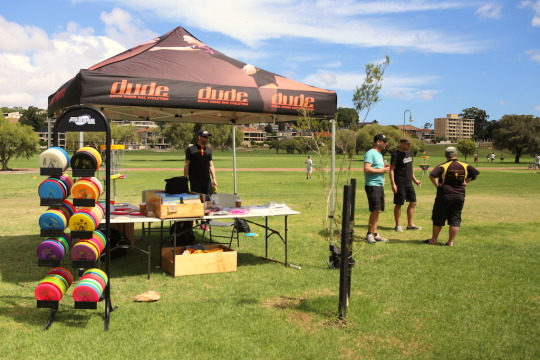
START SMALL
Just like every other part of your plan, first focus the majority of course promotion in your own town or community.
Open the Course: This should be easy, right? Well, it can be! Do you remember those Facebook pages and community websites you used to promote the completion of your project? Keep using those! Many successful, new disc golf courses begin with a simple Facebook page to get people interesting in visiting your course. Community pages for disc golfers made on websites can not only continue, but blossom.
Bringing Friends and Family: When starting your promotion, think of the people that got you there. How can you support those around you like they supported you? Many who can’t afford discs need help starting out. Consider spending a little extra cash to have communal discs, at least for the first few weeks.
Come and Try Day: Invite people to find out about disc golf! One of the best ways to encourage people to support your course is to get them to try disc golf. Those who fall in love with the sport act as beacons for your course, promoting freely on various social media sites and by word of mouth.
GOING LOCAL
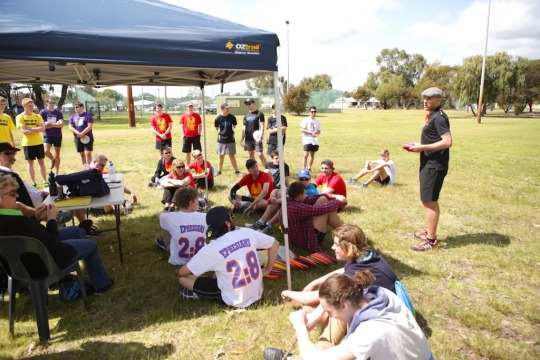
Once you’ve handled the basics, think about actively promoting in your community. Many websites and local outlets are perfect for bringing adults and kids alike to your course.
Schools: Local schools are an excellent location for promotion. Even if you don’t visit individual classes, setting up fliers for events and merchandise is likely to turn some heads. Advertising a family-friendly event is also a great way to involve those in disc golf. Administrators and students alike will love to see continued community support and growth.
Community Groups: Remember when we mentioned Facebook? Well, your disc golf page isn’t the only source for the community. Local organizations and businesses can post on their websites or on Facebook as well!
Local Newspaper: Local newspapers are the perfect platforms to promote disc golf. Not only are advertisements free to cheap, they also reach people in areas you might not expect. Local newspapers are also commonly located outside shops and on the street, so anyone might see your ad!
PUSHING THE BOUNDARIES
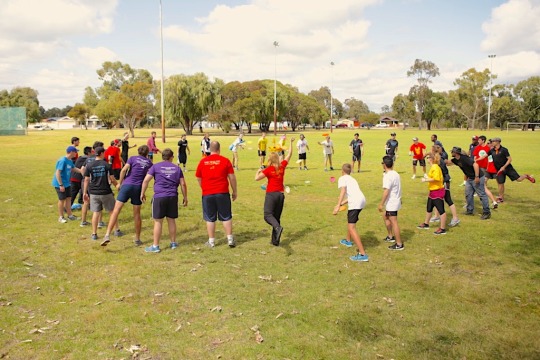
Once your course is more established, promoting to communities outside your own helps establish your course as a destination location.
Run Leagues: Go beyond simple advertisements by setting up a league in your area. Leagues get people interested, and establishing days for league members will promote others to take the plunge.
Run Tournaments: Just about the ultimate goal for any disc golf community is a tournament. People from around the country come to play your game! Community support to promote a tournament is highly beneficial to them as well because tournaments promote economic upturn. How would you like your business promoted through massive visitor inflow?
The Fathering Project: The Fathering Project is Australia-based and made for children all over the country. Through volunteers, father figures work with children to show how important fathers are to a child’s life. The organization offers support for projects and events that encourage fathers to participate in children’s lives, theirs and others. Check out their website to find out how you can participate!
There are many ways to contribute to the promotion of your disc golf course, and you don’t have to do it alone! Friends and family offer free advertisements through word of mouth and online. Take the time to visit local hubs, and, when you’re ready, take the leap to the country!
0 notes
Link
0 notes
Link
0 notes
Text
Looking For A Unique Activity? Try Disc Golf!

Sometimes the bonds we forge with people come from doing new and fun things together rather than just sitting side by side at work all day. While camaraderie and friendships can certainly be created anywhere, there’s just something about going through an experience with others that creates lasting memories and breaks down communication barriers.
While typical ideas like zip lining may be fun for some groups, such extreme activities may not always be appropriate. If you have a group of people, whether it’s co-workers, a church group, or a community service organisation, with varying levels of health, athletic ability, and even ages, what kinds of activities can you do?
Consider Disc Golf
A sport that’s fast becoming more and more popular around the world, disc golf is an all-inclusive activity that’s fun, challenging, and easy to learn. The idea is similar in many ways to traditional golf, where players attempt to get an object into a target with as few strokes as possible. However, instead of using a golf club and a ball, players use varying types of Frisbee, called discs, and throw them from the tee area.
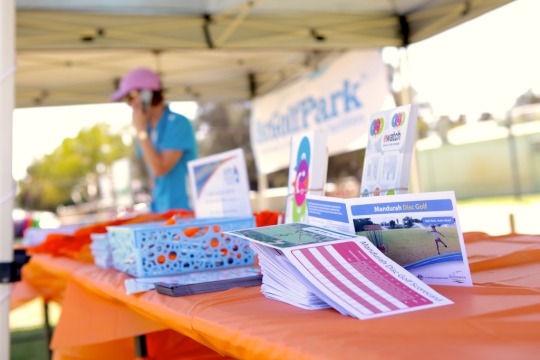
Baskets with chains are used to catch the discs, and course layouts can vary dramatically from easy 9 hole options that let people grow their skill set all the way to long 18 hole areas that weave in and out of wooded sections and require both distance and technique in order to score well.
A Sport For All

Imagine having your next Christmas party on a disc golf course and letting everyone in the office compete for the best score. Perhaps whoever ends up with the best throw on a particular hole gets an extra day of paid vacation, or the person who has the most fun wins lunch at the office. Whatever you decide to do as a group to infuse a light-hearted sense of enjoyment into the game, the ease of play and light level of exercise will be attractive to all.
The sky is the limit when it comes to the ways you can integrate disc golf into your organisation, and it can even become the focal point at a family reunion, birthday party, or act as a weekly event for you and your best friends to get together and see who can score the lowest. With courses often found in public parks, getting to a disc golf course is incredibly easy and will provide a safe environment for even the youngest of children.
As if playing disc golf wasn’t great enough already, it’s a very low-cost option for hosting any type of team building or celebration. Most courses are free to play and many have discs available for rent. If your group is interested in the sport and wants to purchase discs of their own, only a handful are really required while you learn the game, and these also come at very affordable prices.
The next time you’re planning a company event, social outing, or just want something new to do on the weekend with your friends or family, head out to the disc golf course and play a round!
0 notes
Text
Break the Boredom and Make Walking Fun
Getting your 30 minutes of exercise every day is essential to a happy, healthy body. But sometimes it’s hard not to just jump in bed after a hard day of work. Plus, running may be good for you, but at what cost? If you’re not in love with your feet hitting the pavement or weights crushing you, it’s easy to believe that there’s no hope for a happy exercising session.
What about disc golf? It may surprise you to know that people who normally hate exercising love to get out and enjoy a game of disc golf. Disc golf is more than just tossing a disc, and the walks that disc golf offers you to take easily break up an otherwise boring walk.
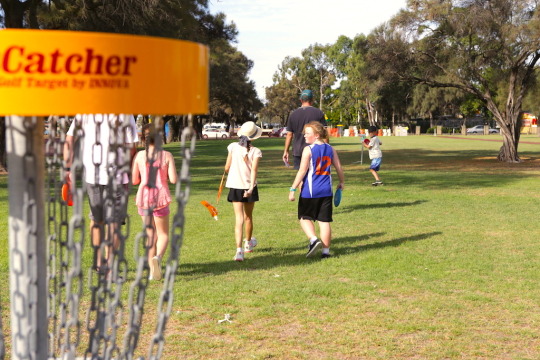
HOW DISC GOLF WORKS YOUR BODY
Walking: A study from the PDGA conducted over 15 courses and involving 340 people consisting of both men and women made it clear that walking is a large part of disc golf. Though that may seem obvious, we’ll bet that you don’t know the half of it. Walking around an 18-hole course gives an average of 5,613 steps, over half of the recommended 10,000 steps every day!
Not only is walking one of the lightest and easiest forms of exercise, it also affects your whole body, making walking, in and of itself, an excellent exercise. Walking not only boosts your legs and butt, but your lower back and arms as well. Because disc golf makes you climb hills and weave in and out of rough terrain, you are getting more of a workout than you realise, and it’s fun!
Strength Training: It’s no secret that disc golf involves muscle strength. Getting your disc to the basket is one thing, but launching your disc from the tee for a forceful putt is another. Muscles controlling balance, flexibility, and power are commonly used in disc golf, which gives you a pleasant alternative to simply walking. For a light activity, disc golf has a lot of extra exercise most wouldn’t expect.
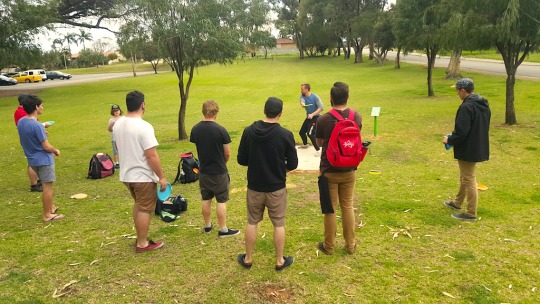
HOW DISC GOLF WORKS YOUR MIND
Let’s be honest, any time spent out in nature is time well spent. But spending the time walking down the same paths every day at the same time can make even your dog, Joey, yawn in boredom. Work your mind on the course and let it take a break from your daily routine.
Brain Activity: Disc golf works your brain by making you think of possible scenarios to throws and movements. Children can especially benefit from this because it encourages thought. Thinking also gives you a break from mindless walking. The best activities exercise both the mind and body!
Chemicals: Your brain works on chemicals; we all know that. Dopamine and testosterone are released in your brain every time you succeed, creating a feeling often called the “winner effect”. Winning a game or achieving a goal affects your brain in the most amazing way, making your brain’s pathways connect, actually making you smarter! Because disc golf is an easier exercise, throwing exceptional throws and accomplishing even a short walk is likely to give you more energy and brain power.
Disc golf is unique because it’s accessible to all ages and skills. So, what are you waiting for? Head out to your nearest disc golf course today!
0 notes
Link
0 notes
Text
Disc Golf and Mental Health - How To Support Those We Care About

Most of the time, there are only a few things on our minds when we reach the disc golf course. From worrying if we brought enough water with us to focusing on finally getting a birdie on that one difficult hole, the disc golf mindset tends to be rather fixed. When you’re about to play in a tournament or even head out for a competitive but casual round, that thought process is fine, but what if there were other things to think about?
Many of us love playing disc golf because of the sense of community it can build, as new friendships are formed that otherwise may never have existed. People look forward to seeing their friends each week at league and you know there’s almost always someone to call when you want to go out and throw. Yet with such a sense of camaraderie, are we shortchanging ourselves by not getting to know each other on a deeper level?
Disc Golf Saves Lives
Talk with any number of people out on the course and time and time again you’ll hear phrases like “This sport saved my life” or “I found a sense of family from playing.” While every story is unique to the individual who tells it, there’s no denying that disc golf, as small as it may seem compared to other sports, has played a huge role in boosting the mental health of men around the world.

Feeling like we belong is a fundamental part of having good mental health and by sharing a common interest with other guys in your area, you’re increasing your level of happiness and ability to feel grounded. Talking about whether you’re playing in the upcoming tournament in town certainly helps you to connect with others, but what we’re really getting at is something much more personal.
Are You Doing Okay?
It’s sad to say and uncomfortable to think about, but sometimes men’s mental health concerns lead them to self-harm and even taking their own lives. While this doesn’t necessarily have a specific correlation to playing on a sports team or not, consider how you can take an active role in making sure that your friends are doing okay. Asking the question is tough, and for some, answering it can be even more difficult, but if no one checks in on each other, the consequences could be devastating.
The next time you’re playing a round of disc golf, look your friends in the eyes and ask how they’re doing. Create a safe space for them to share what’s on their mind by listening without judging and only offering advice if they want it. More often than not, we just want to be heard without having other people trying to “fix” our problems, so it’s important that you act as a support system for your golfing buddies.

If it sounds too intense, think back to a time when you really needed support around your own mental health and consider how big of a difference it would have made if someone asked you how you were doing. The disc golf communities around the globe are incredible, and it just makes sense that players can be there for each other during difficult times in life.
0 notes